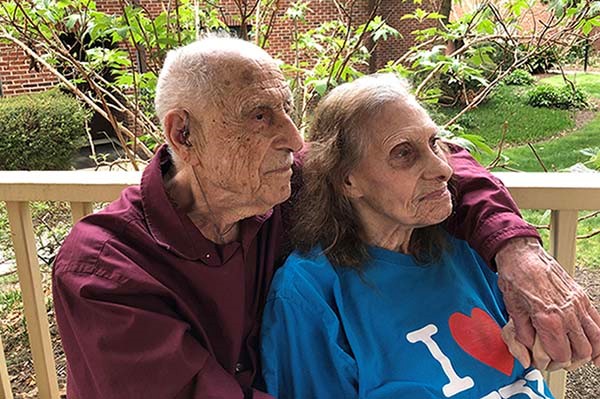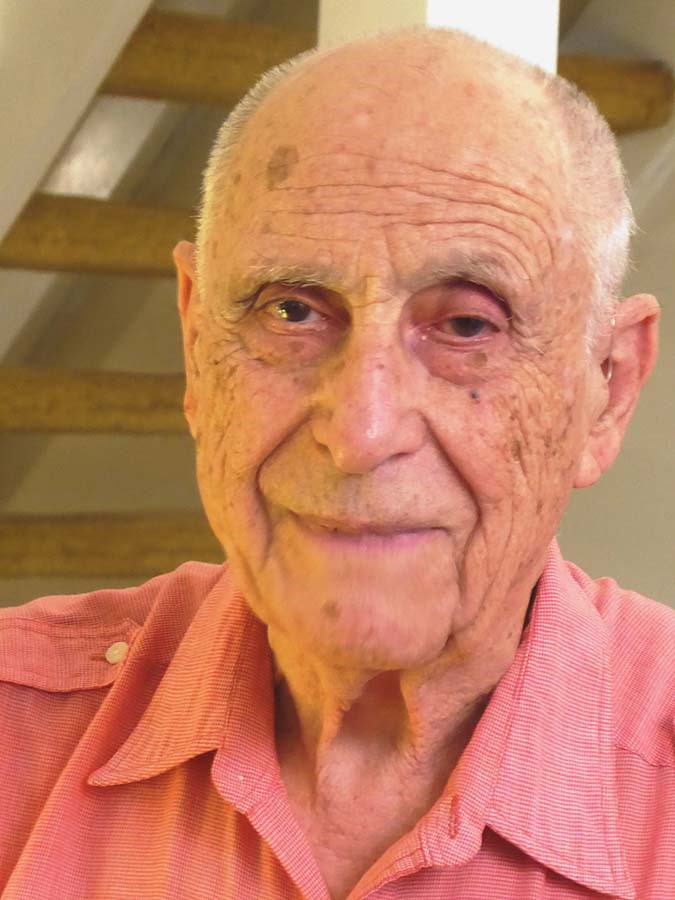Guest Article by Walter Marinetti
Many years ago, when I was in the springtime of my youth, I first heard the memorable September Song. It tells of the wooing of a young woman in the May of her youth by her suitor, an elderly man in the September of his life. Life, he intones, is a long passage from the May of youth to the December of life’s end, and he would spend these few precious September days with her.
My wife Lee is 93 (soon to be 94), and I am 100. We have reached November and its few, even more precious days.
 On this November day, in late afternoon, we sit together in “Lee’s gazebo.” “This is a nice gazebo,” she tells me. “This is a nice bench. Comfortable and warm sitting on this nice bench. The wind is blowing the leaves. Nice breeze. I like the breeze. And the sun is nice this morning.” (It’s actually late afternoon with a gradually setting sun.) “Beautiful day. Bright day, lighting the trees and the leaves. Nice breeze blowing the leaves.”
On this November day, in late afternoon, we sit together in “Lee’s gazebo.” “This is a nice gazebo,” she tells me. “This is a nice bench. Comfortable and warm sitting on this nice bench. The wind is blowing the leaves. Nice breeze. I like the breeze. And the sun is nice this morning.” (It’s actually late afternoon with a gradually setting sun.) “Beautiful day. Bright day, lighting the trees and the leaves. Nice breeze blowing the leaves.”
Lee has memory loss with dementia and repeats many times her observations of the nice breeze blowing the leaves, the nice sun, the bright day. She is very observant, very aware, and savors so much the beauty and joy around her.
“The sun lights up a place on the nice, pretty, red brick wall. It’s all golden sun.” And the sun’s golden rays do indeed come through the leaves and the trees to light up a patch of the brick wall. She sees the aliveness of leaves still green, the glowing red of other leaves that have caught the lowering sun. Life is warm. Life is good here in the gazebo with my partner, my wife, My Love.
“Such a nice gazebo. I like its shape, the nice color. There’s a pretty lamp lit in that window. So nice and comfortable and warm sitting on this bench, such nice benches in this gazebo. The dome of this gazebo is such a good cover. A rabbit just ran on the ground!” She happily prattles and repeats. “Look at the sky! Bright sunny sky, very sunny sky, beautiful cloud, beautiful tall trees.” And in the gazebo, in the lengthening shadows of the ending of the day, as the path lanterns come on, the gold, the green, the brown is complete with us. We are together. We are alone: such treasured aloneness in these fleeting days of November.
This portion of an hour that we are alone together, seated in the gazebo and sharing the setting sun that turns patches of wood, leaves, and red brick wall to gold, is now more treasured, more memorable than any accolades, any grand experiences. Not even that first glimpse, as though a mirage, of the fabled lost city of Petra in Jordan—or seeing a red sail in the sunset when as a soldier, I traveled by WWII wartime convoy up through the Philippine Islands to reinforce our troops in the newly liberated city of Manila—not even those grand experiences rival this precious time together.
On this late afternoon of November, we are together, complete, alone, as Lee sits in our gazebo—Lee’s gazebo—her face radiant with joy, savoring the “morning” (late-afternoon) sun that lights with gold the patches of leaves and the red brick wall. Despite memory loss, despite dementia, she is filled with the delight of the moment. This I will remember.
December will inevitably come, ending these few precious days of November sunset. I may or may not be here then. As the shadows deepen, I pray for Lee: Please, Powers of the Universe, let one last ray of sun come through the trees to light up a patch of the nice red brick wall with its gold!
And may December not linger but be mercifully brief.

For now, here sits Lee in her nice gazebo on her nice bench, her face radiant with joy, savoring the late afternoon setting sun lighting patches of leaves and the red brick wall with gold. Just we two in that aloneness so precious, taking in the fading light together. Lee, despite memory loss, despite dementia, relishing the moments, living… Life!
Born in Brooklyn, Walter Marinetti developed an interest in sports, art, and museums. After high school he served in the Army during World War II. With the GI Bill, he studied Theatre and Anthropology. His career began with museum exhibits and ended as a professor of Humanities and Anthropology. He and his wife, Leona, reside in Springmoor Retirement, Raleigh, NC where he is Leona’s caregiver as she lives with memory loss due to dementia.









A beautiful presentation of the article, including the photos, so impressively presented. Thank you, Caregiver’s Voice. Walter Marinetti
Walter your words add up to a message that permeates your love for Leona.
Thank you for sharing this truly inspirational view for The Caregiver’s Voice readers.
And thank you, Sarah for sharing Walter’s story.
Brenda Avadian
Walter, thank you for this deeply moving testimonial to the power of love through all kinds of change and loss. What comes across most strongly to me is that both you and Lee continue to attend to the beauty around you with a deep presence that brings connection and joy. Blessings on your love and your choice in each moment to stay open, present, grateful, patient, and filled with gratitude what is here.